[Livestock Investigation Bureau]
Editor’s note:
This is the People’s Livestock Investigation Bureau. See what people have not seen, and investigate changes in people’s livelihood. Pay attention to what you want to pay attention to, what you don’t pay attention to, and investigate what you want to see and haven’t seen.
China News Service client side Beijing March 26th, question:Up! Up! Up! "Delivery Freedom" is leaving us
Author: Xie Yiguan
Takeout is getting more expensive!
After "Cherry Freedom" and "Toon Freedom", "Takeaway Freedom" is also leaving us.
"In recent times, takeout has become more expensive. Before, 20 yuan was enough to eat, but now 25 yuan is not enough," said Liu Jiang, a human resources system developer in Beijing.
Liu Jiang was not the only one who found that takeout had become more expensive. "I order takeout now to see which one is cheaper." "I order Malatang and order similar dishes as before, but the price is a little more than before."
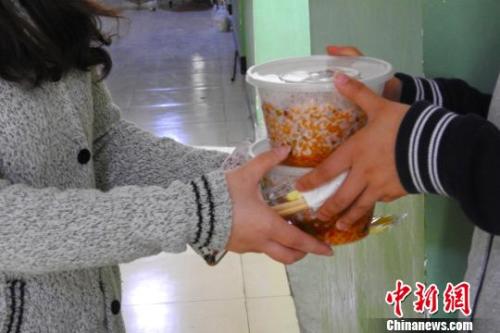
Takeaway delivery staff deliver takeout to student dormitories. Photo by interviewee
"When I was in college, I ordered takeout if I didn’t want to eat in the cafeteria. A braised chicken and rice was less than 10 yuan, and two cups of milk tea were just over 10 yuan," said Shen Li, who has been in the workplace for two years. "At that time, takeout was very cheap, and now you can’t find it at this price."
Price-break discounts less
When ordering a takeaway, consumers typically need to pay for food, packaging, and delivery. If there are price-break discounts or vouchers, the cost can be reduced accordingly.
Due to his inability to cook, Liu Jiang didn’t even buy pots and pans when he came to work in Beijing for two years. If he was hungry at home, he would often order takeout.
Recently, he found that the price-break discounts of takeout are significantly less. "I order takeout completely out of experience, and I usually use price-break discounts to make myself more cost-effective. Recently, I obviously feel that the price-break discounts are less. Several people around me have also told me that takeout is expensive."
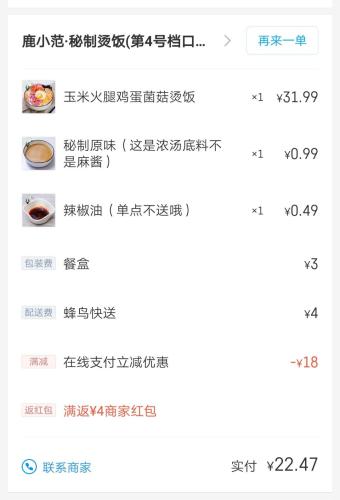
Screenshot of takeaway order
"After the Spring Festival, takeout is really expensive, not only the full price is reduced, but the starting price is also higher," said Jiang Si, who works in new media in Beijing. "There used to be takeout under 20 yuan, but now there are more than 20 yuan. I am very grateful."
Why do merchants reduce price-break discounts?
A staff member at a restaurant in Xicheng District, Beijing, told reporters that the recent cancellation of price-break discounts in the store was mainly due to the fact that the platform had the same price as the dishes in the store, and the sales volume of the platform was similar to that in the store. However, after the platform reached a certain amount, it had to charge a certain set fee, which did not make the restaurant any money.
Delivery fee increases
In addition to lower price-break discounts, the increase in delivery fees has also been confirmed by consumers and delivery staff.
Some netizens reflected, "One afternoon I wanted to drink milk tea, so I opened the takeaway platform and saw that the delivery fee of the one I ordered before had increased."
Liu Jiang also said, "The delivery fee used to be mainly 5 yuan, but now it has risen slightly, and 6, 7 and 8 yuan are more."
The reporter noticed that, from the perspective of consumer feedback, compared with the previous delivery fee of 3-5 yuan, the current delivery fee for a takeaway often costs 6-8 yuan, and sometimes it also encounters a situation of 9-10 yuan. The distance may be as high as 15 yuan.
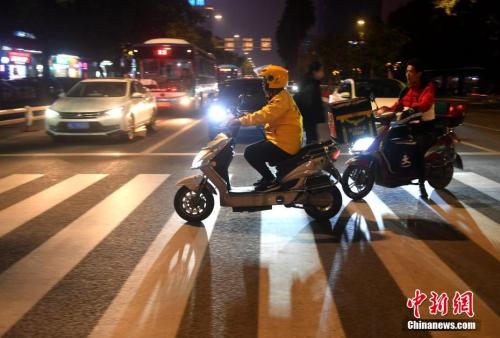
Data map: Delivery staff An Xing on the way to deliver food. China News Agency reporter, Lu Ming, photo
More than one delivery staff revealed that the delivery fee is determined by the delivery platform. Although the delivery fee has increased, their income has not increased, and they should still take as much as they want.
A merchant with a store in Fengtai, Beijing, also told reporters that the delivery fee is currently paid by the buyer and the merchant together, and the delivery fee is determined by the platform. "Price-break discounts are determined by the headquarters. At present, the full 25 is reduced by 18, and the full 49 is reduced by 21. As for the commission, the platform will increase it from time to time."
Merchant: It’s not the price you raised.
Many takeaway merchants said that the price increase of takeaway is not their own price, but the delivery fee and the platform’s commission (commission) are getting higher and higher, resulting in high settlement prices.
"There is basically no profit in doing takeout now," said the above-mentioned merchant in Fengtai, Beijing. "Although the cost has increased, the price of our dishes has not increased, mainly because we know in our heart how much this item is worth."
According to media reports, Meituan increased the commission for merchants before the Spring Festival, and issued a notice to merchants that the changes in self-delivery and Meituan special delivery points were as follows: 10% exclusive self-delivery, 15% non-exclusive self-delivery, 18% exclusive special delivery, and 25% non-exclusive special delivery.
In this regard, Meituan takeaway staff explained that the increase in commissions is mainly due to the increase in company operating costs and labor costs. According to media reports, in recent years, Meituan has established an intelligent scheduling system and developed intelligent voice assistants to improve delivery efficiency, investing a lot of money.
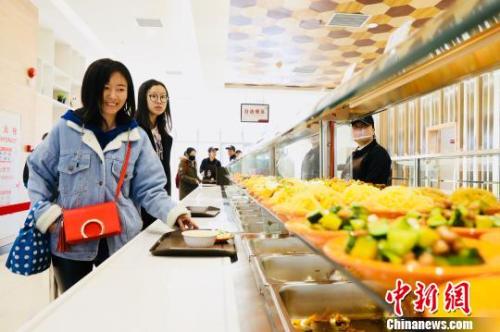
Infographic: Consumers eating at a restaurant. Photo by Park Feng
The increase in commissions is not limited to Meituan. Another takeaway platform, Ele.me, also reported that the commission rose from 18% to 26%.
However, Ele.me denied this. "Since the beginning of this year, there has been no policy to increase the rate for merchants across the country, and we are still striving to reduce the rate. Since January 2019, we have reduced the rate by 2% -3% for more than 10,000 merchants in Guangdong, Fujian and Sichuan, and reduced the delivery fee."
Why should the platform increase the commission?
"Users enjoy huge benefits in the platform’s subsidies, but in order to survive, the platform needs to improve its’hematopoietic ability ‘and increase its commission," said Chen Liteng, an ecommerce analyst at the e-commerce research center.
Started in 2003, online takeout has experienced explosive growth in the O2O tide of the mobile Internet. In order to seize the market, various takeout platforms have adopted low-cost promotions that burn money and subsidize, attracting a large number of merchants and consumers.
With the entry of capital and the subsidy of burning money, the takeaway industry has experienced an era of melee and competition between the two heroes in just a few years.
In August 2017, Ele.me acquired Baidu takeaway, which used to be "red, yellow and blue", leaving only Meituan and Ele.me’s "yellow and blue" dispute. According to the latest report of DCCI Internet Data Center, Meituan’s takeaway market share accounts for 64.1%, and Ele.me accounts for 33.7%.
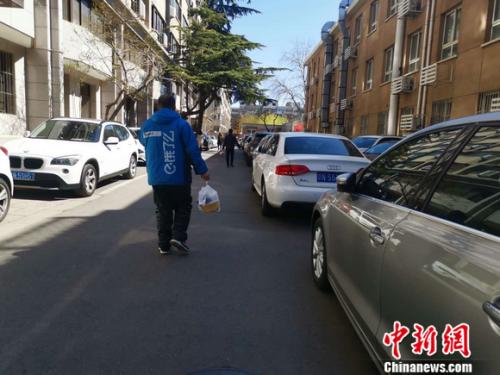
The picture shows the Ele.me delivery staff delivering food. Xie Yiguan, photo
The crazy subsidies in the early stage of the platform have led to rising operating costs and increased profit pressure. Meituan’s financial report shows that its revenue in 2018 was 65.23 billion yuan, an increase of 92.3% year-on-year; but its loss was 115.49 billion yuan, the highest level since its listing.
"The takeaway industry has entered the second half and entered the traffic harvest period." Some people believe that in the face of increasing losses and an increasingly severe market, the platform’s development appeal has changed from seizing the market to achieving profitability.
The Meituan Review Research Institute report unabashedly pointed out that after experiencing the peak growth in 2014, the size of the takeaway market and the growth of users both declined for four consecutive years from 2015 to 2018. The market growth rate dropped sharply from 71% in 2014 to 18%, while the user growth rate dropped from 51% to 15%.
The wool comes from the sheep.
The survey found that some well-known restaurants or chain stores have a stable customer base and have relatively strong market bargaining power. After the platform commission increases, these big merchants can take measures such as increasing the price of dishes, reducing price-break discounts, or delivering takeout by themselves.
In reality, many small businesses that mainly sell takeout orders have poor bargaining power, and after the platform increases the commission, they have no choice. Because customers are unstable, they dare not easily increase the price of dishes, so they can only "discount" the food, or simply close the store.
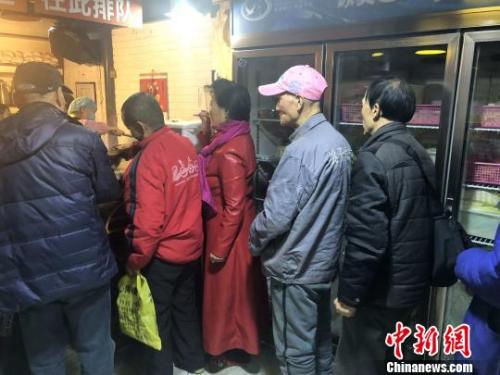
Data map: People queuing up for dinner in the restaurant. Photo by Gao Cheng
Chen Liteng pointed out that in order not to lose money, merchants will save expenses by reducing the size of meals, increasing the price of meals, and adding lunch box fees, and eventually some of these costs will be passed on to consumers.
"The platform takes a cut and the delivery fee increases, which can only cancel the price-break discounts activity and increase revenue," said Auntie Lin, who runs a nori rice shop. "Even if there were price-break discounts and other activities in the past, the takeaway price was higher than the price you bought in the store, because the additional cost of takeaway was charged to the customer."
How can takeaway prices not continue to rise?
The controversy over the rise in takeaway prices reflects the contradictions between merchants, customers and platforms.
With Meituan and Ele.me holding a major share of the takeaway market, some netizens argued that "the reason why the platform can repeatedly increase the commission is due to market monopoly, which gives them the power to adjust prices freely."
So, do takeaway platforms have the right to freely adjust prices?
Article 35 of the "E-commerce Law" states that e-commerce platform operators shall not use service agreements, transaction rules, and technologies to impose unreasonable restrictions or attach unreasonable conditions to the transactions of platform operators on the platform, transaction prices, and transactions with other operators, or charge unreasonable fees to platform operators.
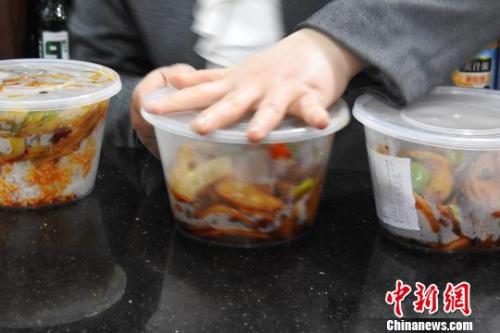
Packaging for takeout. Photo provided by respondents
"In fact, it is difficult to judge whether it is reasonable for the platform to increase the commission rate, and it needs to be judged more realistically." Chen Liteng believes that the relationship between merchants and platforms is mutually beneficial, and platforms and merchants should communicate fully to formulate rules and jointly provide services to consumers.
"Carrying out digital upgrades to create more intelligent catering services may become the key." Chen Liteng said that the intelligent level of takeaway merchants is still in the early stage, and they should continue to adapt to the market, build intelligent catering services under the empowerment of the platform, and improve their own competition level.
In other words, the takeaway platform helps merchants reduce costs and improve efficiency through technological upgrades, and merchants are naturally willing to "give profits" to the platform, so consumers may not have to worry about spending more money on meals.
What do you think of this statement? Has the takeout you ordered recently been expensive?